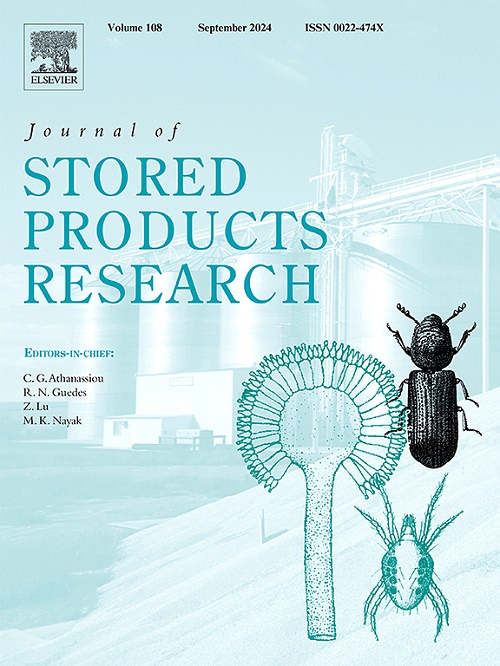Biotoxicity of Limnophila aromatica (Lam.) Merr essential oils against the rice weevil Sitophilus oryzae (Coleoptera: Curculionidae)
IF 2.7
2区 农林科学
Q1 ENTOMOLOGY
引用次数: 0
Abstract
The rice weevil, Sitophilus oryzae (L.), is a major pest that causes damage to post-harvest rice grain products. A promising alternative to traditional neurotoxic insecticides in pest management is the use of biopesticides. In this study, essential oil from the rice paddy herb (Limnophila aromatica (Lam.) Merr) was tested for bioactivity against the rice weevil under laboratory conditions. The results indicated that L. aromatica essential oil functions as a repellent and causes contact toxicity to S. oryzae. Over 80 percentage repellency value was determined for concentrations of 10, 20, and 40% (w/v). At 48 h, the values of LC50 and LC90 of the L. aromatica essential oil for S. oryzae at 48 h were 7.76 and 14.45 mg/ml, respectively. L. aromatica essential oil significantly reduced weevil offspring but had a lesser impact on adult S. oryzae in the fumigation bioassay. GC-MS analysis revealed that monoterpenes are the primary components likely influencing rice weevils. Therefore, L. aromatica essential oil could serve as an effective natural biopesticide for controlling S. oryzae.
求助全文
约1分钟内获得全文
求助全文
来源期刊
CiteScore
5.70
自引率
18.50%
发文量
112
审稿时长
45 days
期刊介绍:
The Journal of Stored Products Research provides an international medium for the publication of both reviews and original results from laboratory and field studies on the preservation and safety of stored products, notably food stocks, covering storage-related problems from the producer through the supply chain to the consumer. Stored products are characterised by having relatively low moisture content and include raw and semi-processed foods, animal feedstuffs, and a range of other durable items, including materials such as clothing or museum artefacts.

 求助内容:
求助内容: 应助结果提醒方式:
应助结果提醒方式:


